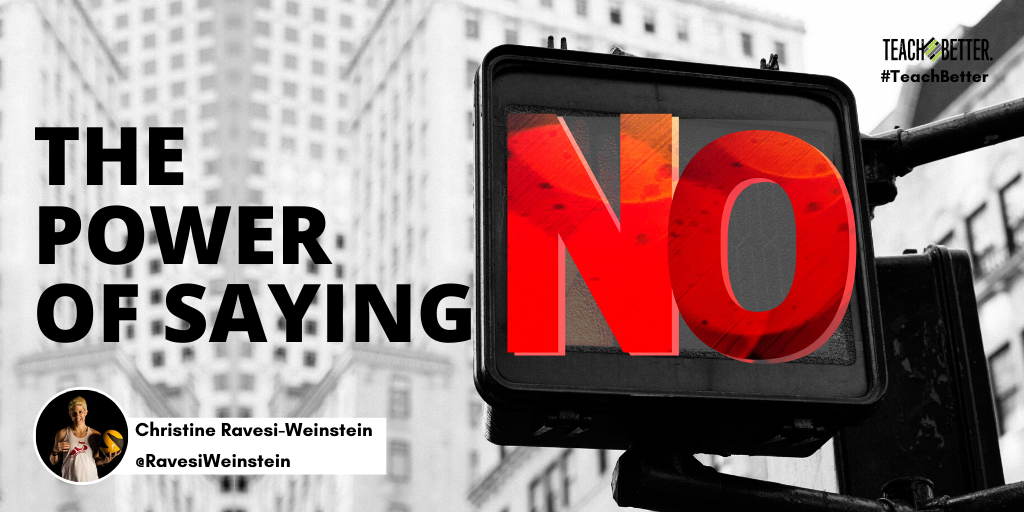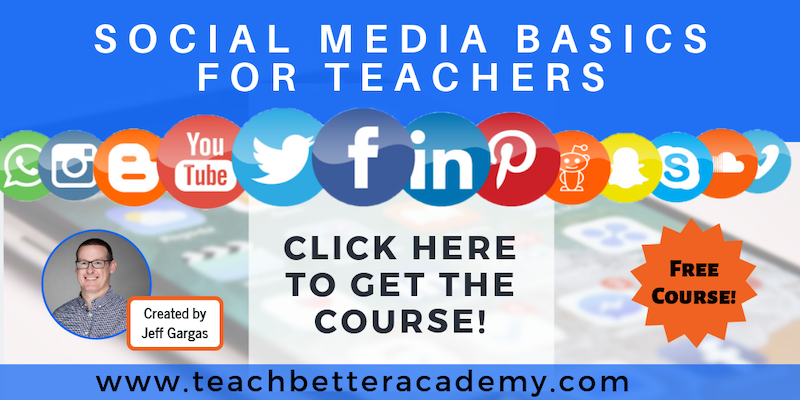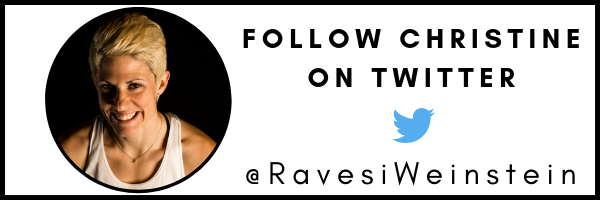TL;DR:
- Learning to say “No” as a self-care strategy
- Engaging in positive communication with others
The COVID-19 pandemic has tested us all. From students, to teachers, to administrators, to district leaders and families, we’ve all faced challenges we never thought we would see.
As educators, it’s our nature to always put the needs of others first. It’s why we got into the field in the first place. But how good can we be for others if we’re not first prioritizing ourselves?
This question is one to reflect on under normal circumstances. Add a pandemic to the mix, and it becomes one we must prioritize.
Saying, “No” doesn’t have to mean you don’t care about others, it means you do care about you. Click To TweetStudents and families are struggling to get by during these times. In my home state of Massachusetts, over a third of people are food insecure. The nation is seeing it’s highest rate of unemployment since the Great Depression. Many students don’t have the resources to engage in remote learning, i.e., hardware and accessibility. The stories of altruism flooding the news provide us with hope.
But what about ourselves? Are we taking care of our own needs too?
Connecting with a PLN
As part of the silver lining that comes with challenging times, I’ve been able to make meaningful connections with my professional learning community (PLN) for the last two months that I might otherwise have not.
Through webinars, remote professional development and Twitter chats, I’ve engaged in learning opportunities relevant to my needs as a public school administrator working from home. While tech ed platforms are an ongoing area of learning and growth for me regardless of circumstance, self-care strategies now have quickly risen to the top of my list of must-knows.
With the list of demands on educators growing by the day, from virtual meetings to the logistics of planning year-end building clean outs, I’ve suddenly seen the need to get in touch with taking care of myself. Many strategies have been discussed with my PLN: time outdoors, unstructured time with my children, and exercise.
All of these are familiar, even if not used enough. But one of the most impactful strategies we’ve discussed, is one that is the most foreign to me: the power of saying “No.” Are there benefits to saying, “No”? If so, what makes saying, “No” so difficult? And how can we support our colleagues in saying, “No” more often? These very questions were asked in a Twitter chat I hosted on May 6th.
Here is what I learned.
Why it’s so difficult saying “No”
Saying, “No” isn’t easy. We know that, but why? I learned that saying, “No” can have a negative impact on not only others, but also on ourselves. Educators are passionate, giving, and supportive by nature. We want to feel useful. Saying, “No” goes against our very nature.
Educators are driven to be as much a part of the solution as possible. Saying, “No” perceivably goes against that desire. We are afraid of missing out on a solution or something bigger than ourselves. We’re solution-oriented. We want to fix whatever possible to make those around us better; happier. We’re people-pleasers.
But saying, “No” can be stressful. We’re afraid of disappointing others; letting them down. People can take “No” poorly even when it’s not intended. The thought of hurting someone’s feelings is paralyzing. It could rock the boat and damage relationships that took years to build. The hardest part of relationships is conflict. Saying, “No” could undoubtedly create such conflict.
And what about the impact of saying, “No” on ourselves? It can affect our pride. We don’t like admitting that we can’t do something, whether it’s an issue of time or ability. “No” can be a sign of weakness, even if what you’re striving for is perfection or excellence, two things unlikely to be accomplished.
There’s also a side to “No” that puts us in fear of how others might view us professionally. We don’t want to be seen as selfish; not being a team player. Perhaps us saying, “No” is seen as being disrespectful to someone else’s idea. Even worse, “No” can negatively impact our professional standing in a system of hierarchy.
Will there be backlash from administration? Will our position lose security? Maybe we’re early on in our career and we want to make a good first impression? And maybe if we say, “No” because we can’t accomplish it right now, we won’t be asked again later when we might be in a better position to say, “Yes.”
Although it was important to reacquaint myself with all of these reasons, many of them were not reasons I had considered before, or that I couldn’t consider on my own. The most impactful perspective I was given, however, was one that I might never have thought of: saying “No” is so difficult because we don’t want to hear “No” when we ask for something.
The benefits of saying “No”
As difficult as it can be to say, “No,” there are benefits. Hence it being a very powerful self-care strategy, especially now. The most obvious benefits are those that positively impact ourselves. It reduces the anxiety and stress that comes with over extending yourself. It prevents exhaustion. Saying, “No” allows you to set boundaries; you have more time to finish your own “To-Do” lists.
You can breathe, spend time with your family, prioritize, and perfect what it is you’re already doing. “No” allows you to tackle depth over breadth; sometimes less is more.
But all of these reasons are logistical. What about the positive impact “No” can have on your psyche; your sense of self? Saying “No” allows you to focus and reflect on your goals, vision and professional why.
You can concentrate more on your passions and bring balance into your life. “No” can bring you a sense of control and confidence. It shows inner strength and resolve; gives you a sense of empowerment. Saying “No” is a way to honor yourself and your needs, and perhaps, you may even be more likely to try something new you’ve been putting off for awhile. It is an opportunity to be the best version of yourselves for others.
“No” can also have a positive impact on others. If framed correctly, “No” can build respect between colleagues. It’s a way of modeling that it’s okay to say, “No.” You may empower others to reach out to someone they may not have reached out to. And most importantly, “No” can be the start of a conversation and/or collaboration that may never have started otherwise. “No,” a participant noted, can mean more room for another “Yes” along the way.
Supporting each other to say “No”
There is a negative stigma associated with saying, “No”. If one of the benefits is that it prioritizes ourselves, how can we support others in doing the same? After all, education is all about support.
Chat participants focused on the need to build meaningful relationships with colleagues first. No support can be established for others without, first, having trust.
Engage in positive communication with each other. Genuinely check-in and learn to anticipate the other’s needs. Learn what the other’s why is, and remind them of their goals. Be the other’s accountability partner; apply checks and balances when they can’t provide them themselves. Remind them they are not disappointing anyone when they say “No,” but are disappointing themselves when they say, “Yes.” Model it. Advise them, but don’t make the decision to say, “Yes” or “No” for them. Give them space. And most importantly, give them grace when they do say, “No.” Don’t question it. Respect it, move on, and don’t ask why.
[scroll down to keep reading]Relying on your people when saying no
We are all reeling right now. Education is a social profession. It’s work that’s built on relationships and interaction. We talk, show, lead, model, and feel. All of these things are optimized in the physical schoolhouse walls. And now that COVID-19 has taken those walls from us, we are working overtime to find a way to accomplish the same things through a vastly different environment.
As we work harder and longer, we wear ourselves thinner and thinner. Educators might be more physically well-rested (we’re not on our feet all day moving non-stop through our classrooms and schools), but we are more emotionally drained.
We need to take our self-care more seriously than we might have during a “normal” school year. This means tapping into any and all strategies, no matter how uncomfortable or unfamiliar.
The professional learning network that I have come to rely on so heavily during this pandemic has taught me to face the more foreign strategies head-on; to take the risk for the betterment of myself and hence, my colleagues and students. “No” can be one of the most powerful ways to take care of ourselves.
But regardless of the benefits, it is stigmatized to have more negative implications than positive. Sure, it might be taken as a disappointment; no one likes hearing “No.” Perhaps it might be misinterpreted as disinterest or selfishness, but all of these assumptions are just that, assumptions. They have a short lifespan and can be avoided by building positive relationships with colleagues.
Saying, “No” doesn’t have to mean you don’t care about others, it means you do care about you. And let’s start taking this perspective: “No” doesn’t have to mean “never,” it can simply mean, “Not yet.”
About Christine Ravesi-Weinstein
Christine Ravesi-Weinstein is an avid writer and educator and is passionate about bridging the two with her advocacy for mental health. She currently serves as a high school Assistant Principal and previously worked as a high school science department chair for four years and classroom teacher for 15 years. Chistine is a Times 10 author and her first book, Anxious, is scheduled for publication in March 2020. Follow her on Twitter @RavesiWeinstein, on YouTube at The Runner’s High, read her other work here, and about her organization at http://www.runningfromanxiety.org; @ThinkRunFight.
Subscribe to Christine’s YouTube Channel.
Check Out Christine’s Other Work.
Learn More About Christine’s Story.




